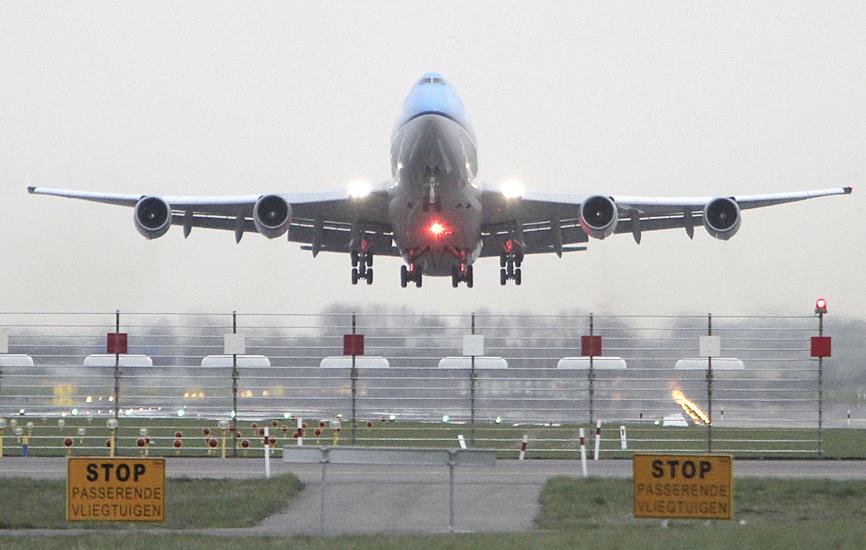The Dutch government is to halt its multibillion-euro COVID-19 bailout to national carrier KLM amid a standoff with a pilots’ union about terms of the rescue package, Dutch Minister of Finance Wopke Hoekstra said on Saturday.
The dispute, if not resolved, could have dire consequences for KLM, which employs about 30,000 people.
The company on Friday announced that it recorded a loss of 234 million euros (US$273 million) in the third quarter of this year as a result of the aviation slump caused by the COVID-19 pandemic.

Photo: AP
“Without this loan, KLM will not get through this difficult time,” chief executive Pieter Elbers said in a statement. “This makes this impasse extremely worrying.”
The Dutch government in June threw KLM a 3.4 billion euro lifeline to help the airline survive the sharp downturn in air travel amid the pandemic.
The package is made up of a 1 billion euro loan and 2.4 billion euros in guarantees for bank loans.
However, there were strings attached, including a demand that KLM cut costs by 15 percent, and improve its sustainability.
“It is up to KLM and the unions to ensure that the conditions set are still met,” Hoekstra said in a letter to the Dutch parliament.
KLM submitted a restructuring plan to the government on Oct. 1, in which labor unions representing pilots, cabin crew and ground staff agreed to pay cuts.
However, the agreements only apply until 2022; Hoekstra is seeking assurances from KLM that unions would agree to pay cuts throughout the duration of the bailout, likely five years.
KLM said five labor unions agreed to sign a “commitment clause,” saying their members would agree to pay cuts for the full duration.
It said one of the unions representing cabin and ground staff was still considering the matter, while the pilots’ union did not sign.
Hoekstra called the pilots’ stance “very disappointing and risky.”
The pilots’ union said its members already have agreed to a 20 percent pay cut and that they are committed to “continue taking responsibility to get KLM through the crisis and make it a healthy company again.”

‘SWASTICAR’: Tesla CEO Elon Musk’s close association with Donald Trump has prompted opponents to brand him a ‘Nazi’ and resulted in a dramatic drop in sales Demonstrators descended on Tesla Inc dealerships across the US, and in Europe and Canada on Saturday to protest company chief Elon Musk, who has amassed extraordinary power as a top adviser to US President Donald Trump. Waving signs with messages such as “Musk is stealing our money” and “Reclaim our country,” the protests largely took place peacefully following fiery episodes of vandalism on Tesla vehicles, dealerships and other facilities in recent weeks that US officials have denounced as terrorism. Hundreds rallied on Saturday outside the Tesla dealership in Manhattan. Some blasted Musk, the world’s richest man, while others demanded the shuttering of his

ADVERSARIES: The new list includes 11 entities in China and one in Taiwan, which is a local branch of Chinese cloud computing firm Inspur Group The US added dozens of entities to a trade blacklist on Tuesday, the US Department of Commerce said, in part to disrupt Beijing’s artificial intelligence (AI) and advanced computing capabilities. The action affects 80 entities from countries including China, the United Arab Emirates and Iran, with the commerce department citing their “activities contrary to US national security and foreign policy.” Those added to the “entity list” are restricted from obtaining US items and technologies without government authorization. “We will not allow adversaries to exploit American technology to bolster their own militaries and threaten American lives,” US Secretary of Commerce Howard Lutnick said. The entities

Minister of Finance Chuang Tsui-yun (莊翠雲) yesterday told lawmakers that she “would not speculate,” but a “response plan” has been prepared in case Taiwan is targeted by US President Donald Trump’s reciprocal tariffs, which are to be announced on Wednesday next week. The Trump administration, including US Secretary of the Treasury Scott Bessent, has said that much of the proposed reciprocal tariffs would focus on the 15 countries that have the highest trade surpluses with the US. Bessent has referred to those countries as the “dirty 15,” but has not named them. Last year, Taiwan’s US$73.9 billion trade surplus with the US

Prices of gasoline and diesel products at domestic gas stations are to fall NT$0.2 and NT$0.1 per liter respectively this week, even though international crude oil prices rose last week, CPC Corp, Taiwan (台灣中油) and Formosa Petrochemical Corp (台塑石化) said yesterday. International crude oil prices continued rising last week, as the US Energy Information Administration reported a larger-than-expected drop in US commercial crude oil inventories, CPC said in a statement. Based on the company’s floating oil price formula, the cost of crude oil rose 2.38 percent last week from a week earlier, it said. News that US President Donald Trump plans a “secondary